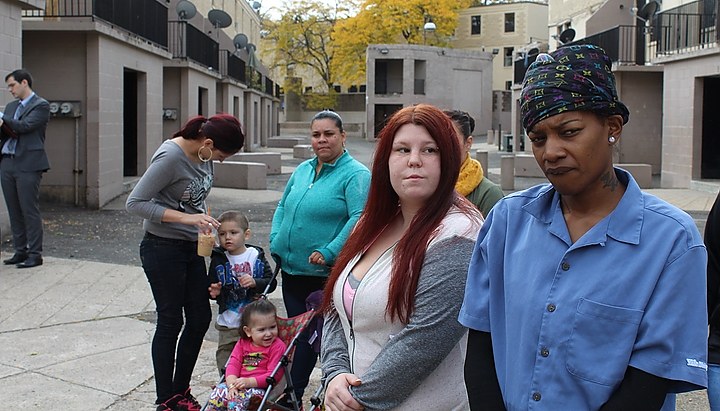
Courtesy of Paul Bass
After over three years of court proceedings and added delays, the most recent of which was brought upon by the pandemic, plaintiffs of New Haven’s largest tenant class action lawsuit in recent years have reached the final steps of a settlement.
On Wednesday evening, Superior Court Judge Linda Lager granted preliminary approval to a lawsuit filed by about 1,000 former residents of the now-razed Church Street South, a federally subsidized apartment complex located across from Union Station. The ruling has brought these residents one step closer towards finalizing a settlement deal with their former Massachusetts-based landlord, Northland Investment Corporation. New Haven civil rights attorney David Rosen LAW ’69 assisted the plaintiffs, including lead plaintiff Personna Noble, in filing the initial civil summons in December 2016.
Through the suit, the plaintiffs sought monetary reimbursements for a litany of health-related problems that they attributed to the neglected conditions of the demolished apartment complex. Residents said they experienced skin disorders, migraines and respiratory problems due to hazardous apartment conditions. This past March, right before the pandemic hit, Rosen and attorneys for Northland Investment Corporation reached an $18.75 million settlement.
“Everyone is very eager to have the case go forward so that they can finally get the benefits for themselves and their families,” Rosen said. “We tried very hard to make the settlement as fair and just as possible, and within the limits of the possible we think it measures up well.”
Northland has refused all allegations of wrongdoing. In a statement to the News, the company said that it has “denied, and continues to deny all allegations whatsoever of any wrongdoing.”
The most recent settlement will create a trust to allocate funds for minors, disabled class members and the estates of deceased class members, which the March 6 settlement would not have provided. The newest settlement also simplifies the forms plaintiffs must complete to qualify for funds.
Rosen told the News that all approximately 1,000 members of the settlement will receive a $5,000 base payment, with an additional $3,000 for every year that they lived on the property. Some former residents will get as low as $8,000, while others will receive as much as $20,000. The court’s preliminary approval allows the plaintiffs a final chance to join the settlement and qualify for payments, a process Rosen says will finish in about six months.
The arrival of the settlement was slowed by the pandemic, which brought courts to a “screeching halt,” Rosen said. On March 10, Gov. Ned Lamont signed an executive order suspending noncritical court operations and limiting court hours. For the past two months, the courts have slowly been reopening.
“Finalizing the settlement was delayed along with everything else, but I’m glad we were able to use the time to improve the settlement and also to reach out to more of the former residents,” Rosen told the News.
Northland currently intends to build new housing on the razed land that Church Street South once occupied. As a part of the settlement, Northland has agreed to prioritize former residents as recipients of any affordable and low-income housing built on the land.
“We remain committed to helping the former Church Street families move forward in a positive way and believe this improved process will make it easier for claimants to access funds,” the company told the News in a written statement.
A complex history
Northland bought the Church Street South property in 2008 with plans to redevelop the complex. But plans never materialized, and the complex remained low-income housing due to a combination of the subsequent recession and new community demands for affordable housing — demands that, according to New Haven Independent editor and New Havener of over 30 years Paul Bass ’82, the company had not expected.
In November 2010, the city of New Haven fined Church Street South $63,000 for multiple apartment code violations. Still, the Northland property scraped by a federal Department of Housing of Urban Development inspection that same fall with a passing score — 68 out of 100 points. A passing score is 60 points.
According to Bass, residents complained that these inspectors were always sent to select apartments units, all of which were in better condition than the average unit at Church Street South. Tenant organizing and press attention followed suit.
Northland vacated the apartments by May 2015, forcing out some 300 families, in what Bass called “the biggest displacement of people that I can remember in New Haven.”
A few months later, in August 2015, Bass recorded a video in a basement apartment that provided a glimpse of the living conditions of many of the apartments. The video included footage of a resident peeling paint off the ceiling. Bass said there were “leaks everywhere” and decrepit furniture amid faltering parts of the structure — and that rain made matters worse, adding to the concentrations of mold that made it difficult for residents to breathe. Bass said this was particularly hard on children with asthma.
The site received a HUD inspection score of 20 in September 2015. The inspection found 512 “life-threatening” violations out of 1,015 instances of health and safety violations. These included inoperable smoke detectors, exposed wires and blocked fire exits.
In June 2018, Northland began to demolish the site, promising to redevelop the area into new housing. And the current settlement plans to offer some compensation to the residents who had to stomach these conditions for many years.
The demolished Church Street South complex is located at 34 Cinque Green.
Talat Aman | talat.aman@yale.edu
Gamze Kazakoglu | gamze.kazakoglu@yale.edu







